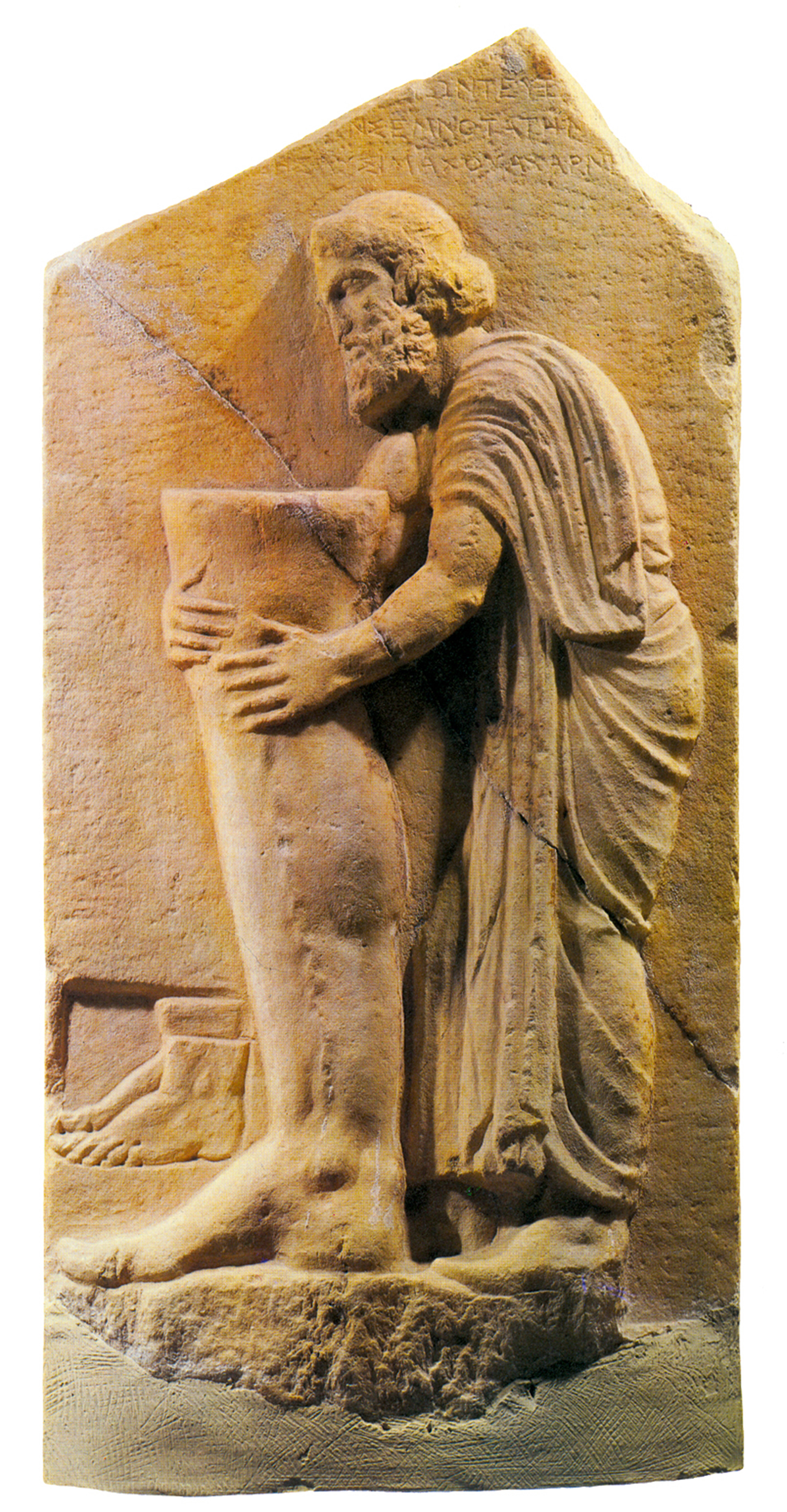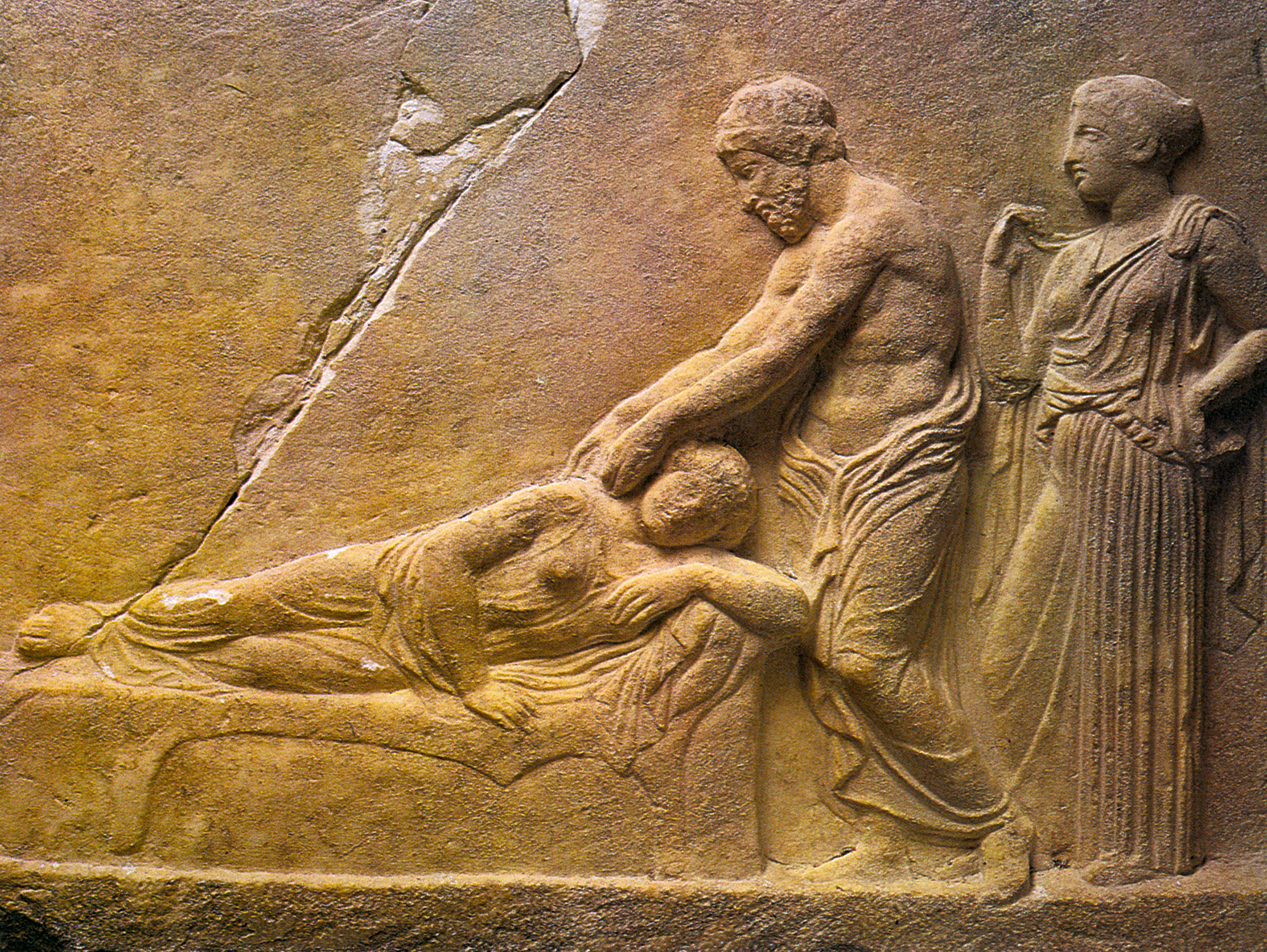Ingestion / The Greek Detox
Aristides and the dream of the gut
Brooke Holmes
“Ingestion” is a column that explores food within a framework informed by aesthetics, history, and philosophy.
The gut has a life of its own. Of all the networks peripheral to the central nervous system, the enteric nervous system is the most autonomous, as well as the most remote from consciousness. It is densely populated: the bowel contains more nerve cells than the spine. The digestive tract, no mere transit corridor, is a mostly uncharted biofloral landscape unique to each organism. These, in any case, are the terms of art for describing life in the age of bioscience. There are, of course, other ways of imagining what goes on in the gut. For the second-century CE Greek orator Aelius Aristides, the way in is the dream.
Aristides was famous in his own day on the imperial lecture circuit for a standard repertoire of rhetorical showpieces: impersonations of Greatest Generation Athenians like Demosthenes standing down the Macedonian juggernaut; exhortations to civic concord; fulsome paeans to Rome and its emperors. He’s known today, when he is known at all, as the most famous patient of antiquity or, less charitably, as the greatest ancient hypochondriac. The work on which his fame now rests consists of five extant books (and scraps of a sixth) of “sacred tales” (hieroi logoi).

The books recount a lengthy, multiform illness that first hit the young Aristides in 125 CE en route from the provinces to Rome with a dream of jumpstarting his career. But despite consulting with the capital’s finest doctors and submitting to a series of invasive examinations, he failed to get a diagnosis, let alone a cure, and he returned an invalid to his hometown of Pergamum, on the west coast of Asia Minor. It was around this time that he started receiving dreams from Asclepius, the most popular healing god in classical antiquity (and one of the most stubborn holdouts against that arriviste healer Jesus Christ). Not even the dreams provided all the answers. But they did offer clues, triggering a practice of daily decoding and therapeutic response to what settled into a chronic condition, as well as a lifelong cult of devotion whose most tangible evidence is the hefty bulk of the Sacred Tales (itself culled from a larger lost archive). The process of interpretation unfolded through biofeedback: a cycle of suffering, dreaming, interpretation, and relief, which starts over again when pain inevitably returns. It gets harder and harder to tell whether Aristides dreams because he suffers, or suffers in order to keep dreaming a story he doesn’t want to see end.
The Greeks had been dreaming about the insides of the body for as long as they thought they had bodies. That turns out to be less time than you might expect. The concept of the physical body, a body with a life of its own happening below the threshold of consciousness, only arrives on the scene in the fifth century BCE. It brings with it a new species—perhaps the first in the West—of self-estrangement. In earlier periods, a symptom usually would have signaled a rupture in your relationship with gods or daemons or a larger-scale crisis in the larger community. With the physical body’s emergence, the meaning of the symptom changes. The crisis is now inside, its origins mysterious. The black box of the chest cavity becomes a place of betrayal and intrigue.
It comes as little surprise that in such a context, orifices acquired new significance. The best way, after all, to control the dynamics of the cavity is to control what goes in, all the while keeping a close eye on what is coming out. The goal, whenever possible, was to avert trouble before it took root, and diet was one way to do that. But in the spirit of our own breast self-examinations and prostate screenings, fifth-century physicians also sought early detection systems. The author of one Hippocratic text, On Regimen, hits on dreams as the perfect solution. In sleep, he writes, the soul turns away from the world and observes the body’s inner life, communicating what it sees via symbols that are decoded in the light of day.
The cult of Asclepius develops in Greece alongside medical dreaming in the fifth century BCE, eventually spreading across the entire Mediterranean. If you read the fourth-century testimonies inscribed on the massive steles preserved at Epidaurus in the Peloponnese, you will find suppliants dreaming that Asclepius himself operated on their bodies. But as time went on, the dreams seem to have become more prescriptive, incorporating the kinds of therapies common in contemporary medicine. By the time we reach Aristides, the god has taken over the soul’s role of observing the inner body in On Regimen. The fragments of meaning that filter into consciousness now come from him.
So what are these fragments? The first reported dream has a stark simplicity: “I dreamed that I had been in some way defiled.”[1] Aristides, reasonably enough, decides to bathe. Wrong answer. He stumbles out of the bath feeling overfull and gasping for breath and, by the middle of the night, his stomach is again in turmoil. Another dream: “I was in a warm bath, and bending forward I saw that my lower intestinal tract was in a rather strange state.” At this point, an unidentified person, of the kind we’re all familiar with from dreams, shows up to tell Aristides that bathing is not, in fact, the problem. Still, back in real life, bathing doesn’t help either. Then: “I dreamed that some Parthians had got me in their power, and one of them approached me and made as if to brand me. Next he inserted a finger in my throat and poured in something, according to some native custom, and named it ‘indigestion.’” It’s the Parthians, this time, who have advice to offer—don’t bathe, vomit—and by complying with their prescriptions when he wakes up, Aristides gets some relief.
But the comfort is here, as always, short-lived: as soon as one defilement is purged, another slips in and the symptoms start over. However much Aristides controls what he eats and what he does, no amount of vigilance creates a sufficient barrier. In another dream, he eats figs before finding out they’re poisoned and, still in the dream, vomiting hysterically (Aristides’ paranoia may have been triggered by imperial gossip: Dio reports in his Roman History that Livia had been suspected by some of killing Augustus with poisoned figs, a scenario that will be familiar to viewers of the BBC’s I, Claudius.) Much like fasting for Kafka’s hunger artist, purging for Aristides is both practice and spectacle. The respected doctor (and teacher to Galen) Satyrus visits him at the Asklepieion, a kind of ancient sanatorium near Pergamum for elite convalescents, and warns him that his passion for enemas is killing him, to which he replies with serene self-righteousness that he takes orders only from the god. The contemporary fad for juice cleanses would have found no more loyal adherent in antiquity.

In fact, Aristides’ story of his abdomen feels right at home in our own thriving detox culture, founded on the omnipresent threat of capitalism’s corrosive runoff accumulating deep inside us. The gut has become ground zero in a fight against toxins that, failing on the macro-scale of politics, has relocated to the individual organism: every biome for itself. In this context, too, symptoms of pain and malaise reveal the darkness of the cavity to be a cover for violence and violation, the orifices as sites in need of policing. The failure to take care (“take care!” is one of the mantras that Asclepius gives Aristides) is settling into the etiology of cancer more insidiously than even Susan Sontag could have imagined.[2]
Aristides finds the antidote to the cavity’s silence in the old homeopathic recipe of like to like: much as pain does, dreams emerge vivid from hazy origins. The dream mediates communication with the cavity, offering up a template for making sense out of the scattered, blank sensations we field from the gut. It’s true that the dream-source of authoritative meaning lies outside the self. But what makes Aristides’ relationship with Asclepius different from conventional scenarios of biomedical authority is that the god is an outsider who, instead of estranging Aristides from his body further, as the doctors in Rome had done (and as tests and machines and medical jargon do today), helps him close the gap between mind and gut. He does so by enlisting him in what we would call biofeedback and the Greek practices of care (epimeleia heautou, souci de soi) made famous by Michel Foucault in the first two volumes of the History of Sexuality. Here, Asclepius begins to look less foreign, less antiquated. In offering an alternative to the medical expertise of imperial-era physicians, he anticipates the naturopathic traditions of self-help united today against the monolith of Western medicine. Aristides called him a god. We’d probably call him a guru.
- Translations are from Charles A. Behr, Aelius Aristides and the Sacred Tales (Amsterdam: Adolf M. Hakkert, 1968). Behr italicizes what he believes are events that take place in dreams, an exercise whose lack of success demonstrates how difficult it is to determine the boundaries between Aristides’ two realities.
- Susan Sontag, Illness as Metaphor (New York: Vintage Books, 1979).
Brooke Holmes is a Hellenist and a comparatist in the Department of Classics at Princeton University. Her books include The Symptom and the Subject: The Emergence of the Physical Body in Ancient Greece (Princeton University Press, 2010), and the co-edited collections Aelius Aristides between Greece, Rome, and the Gods (Brill, 2008) and Dynamic Reading: Studies in the Reception of Epicureanism (Oxford University Press, 2012). She is currently at work on the early history of cosmic sympathy.
Spotted an error? Email us at corrections at cabinetmagazine dot org.
If you’ve enjoyed the free articles that we offer on our site, please consider subscribing to our nonprofit magazine. You get twelve online issues and unlimited access to all our archives.